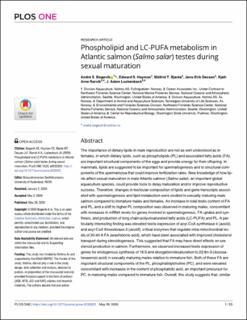| dc.description.abstract | The importance of dietary lipids in male reproduction are not as well understood as in females, in which dietary lipids, such as phospholipids (PL) and associated fatty acids (FA), are important structural components of the eggs and provide energy for their offspring. In mammals, lipids are suggested to be important for spermatogenesis and to structural components of the spermatozoa that could improve fertilization rates. New knowledge of how lipids affect sexual maturation in male Atlantic salmon (Salmo salar), an important global aquaculture species, could provide tools to delay maturation and/or improve reproductive success. Therefore, changes in testicular composition of lipids and gene transcripts associated with spermatogenesis and lipid metabolism were studied in sexually maturing male salmon compared to immature males and females. An increase in total testis content of FA and PL, and a shift to higher PL composition was observed in maturing males, concomitant with increases in mRNA levels for genes involved in spermatogenesis, FA uptake and synthesis, and production of long chain-polyunsaturated fatty acids (LC-PUFA) and PL. A particularly interesting finding was elevated testis expression of acyl-CoA synthetase 4 (acsl4), and acyl-CoA thioesterase 2 (acot2), critical enzymes that regulate intra-mitochondrial levels of 20:4n-6 FA (arachidonic acid), which have been associated with improved cholesterol transport during steroidogenesis. This suggested that FA may have direct effects on sex steroid production in salmon. Furthermore, we observed increased testis expression of genes for endogenous synthesis of 16:0 and elongation/desaturation to 22:6n-3 (docosahexaenoic acid) in sexually maturing males relative to immature fish. Both of these FA are important structural components of the PL, phosphatidylcholine (PC), and were elevated concomitant with increases in the content of phosphatidic acid, an important precursor for PC, in maturing males compared to immature fish. Overall, this study suggests that, similar to mammals, lipids are important to spermatogenesis and serve as structural components during testicular growth and maturation in Atlantic salmon. | en_US |

